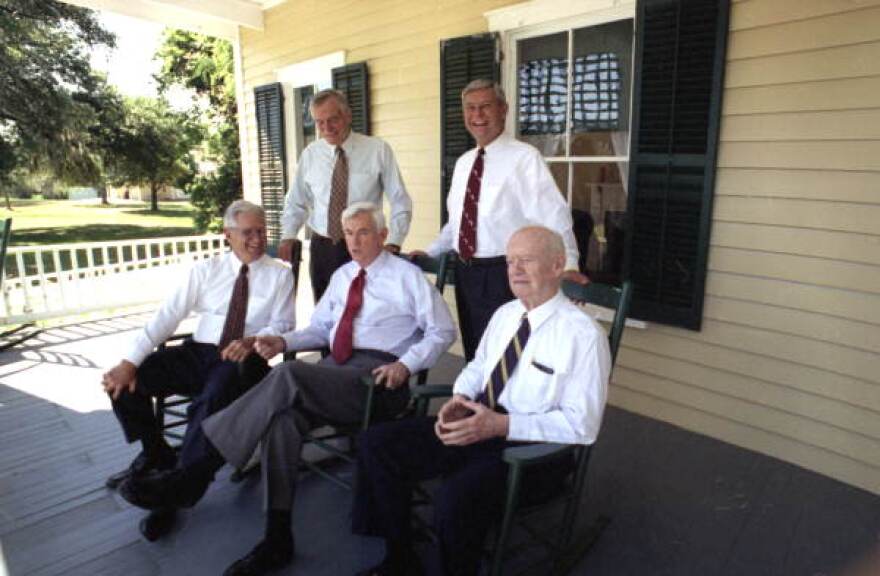Fifty-years ago this month, former Gov. Lawton Chiles wrapped up his 1,000-mile walk across Florida. At the time, he was a candidate for a U.S. Senate seat.
As part of our 50th anniversary series, we’re taking some time to review “Walkin’ Lawton’s” political legacy, as one of the last Democratic political leaders in a state now controlled by Republicans.
“I was campaigning for the State Senate at the same time Lawton was starting his long walk which led to the U.S. Senate,” said former Governor and U.S. Senator Bob Graham, remembering the 1970 election.
Graham first met Chiles when they attended the University of Florida in the 1950s. Graham was an undergraduate and Chiles was in law school.
Ultimately, their political careers, which both began in the state legislature, would follow very similar paths and establish a kinship between them.
“Yes, I think Lawton and I had a lot in common and had a very close relationship while we were both in the U.S. Senate,” Graham acknowledged. “And, he was a teacher to me as I started my career, both in the Florida Legislature and in the U.S. Senate.”

After 18 years (three terms) in the Senate, Chiles came back to Florida and ran for governor, a seat he won in 1990 and held for two terms until his death in December 1998.
Before his 18 years in the Senate, Graham completed two terms as governor from 1979-1987. They were the last Democrats to hold the state’s top political post and shared comparable governing philosophies.
“I think we both started with the belief that understanding what people wanted from their government required a form of governing by the elected officials, which put us in as much contact with the people they were representing as possible,” Graham said.
Getting to know their constituents and the issues important to them is what Chiles was able to accomplish with his legendary walk and Graham was able to do with his famous “workdays.”
We will have more on the iconic campaign strategies in our next report.
During their careers, Chiles and Graham served at a time when elected officials commonly reached across the political aisle to get things done. However, at the height of their power in Florida, the winds of political change began to blow in the state as many so-called Blue Dog Democrats switched to the Republican Party.

“It was in the 1980s or early ‘90s, when the state became a truly competitive two-party state,” recalled Graham. “One of the products of that was a lessened willingness of elected officials to put their partisanship aside and work for what was considered to be in the best interest of the people.”
“My first two sessions in the legislature, we (Republicans) were the minority party. But, when I was elected to my second two-year term, we became the majority party,” said former Republican State Representative Jerry Maygarden, of Pensacola, recalling the Republican Party take-over in the Florida House in 1996.
“So, I went from the back row to the front row in a matter of two years, which is a big change, quite honestly.”
Initially, the GOP held a narrow two-seat majority. According to Maygarden, when it comes to political cooperation, numbers matter.
“When the House is nearly evenly divided, there are issues where you must have the support of the minority party to move things along,” he said.
“And, there are things that are very important to the state that the two parties have in common and they have every reason in the world to want to work together.”
Maygarden says that willingness to work together was still the climate in those years right before-and-after the Republicans took control of the legislature, when Chiles was governor.

“I was deeply concerned about being an opponent, so to speak, but he never let that get in his way. He was willing to reach across the aisle work with legislators who came from another persuasion and another party,” said Maygarden, who rose to become majority leader in the House.
He fondly recalled his first-ever bill in support of the National Guard, and the rare backing he got as a freshman Republican from the state’s Democratic governor.
“He was very supportive of that. So, when I introduced the bill, it made its way through the House, made it through the Senate and made it onto his desk, and he was kind enough to invite me over for the ceremonial signing,” Maygarden recounted. “So, he signed my first bill.”

Chiles, who was the first Democratic governor in Florida to have a Republican-majority legislature, did not let politics get in the way of a good bill - or a good friendship.
He maintained a close relationship with fellow Class of ’66 State Senator John Broxson from Santa Rosa County, including several years after Broxson switched to the GOP.
Just a few of Chiles’ many accomplishments include creation of Florida’s Department of Elder Affairs and Healthy Start program.
Additionally, he was governor when Florida successfully sued the tobacco industry, which resulted in an $11.3 billion settlement for the state.



